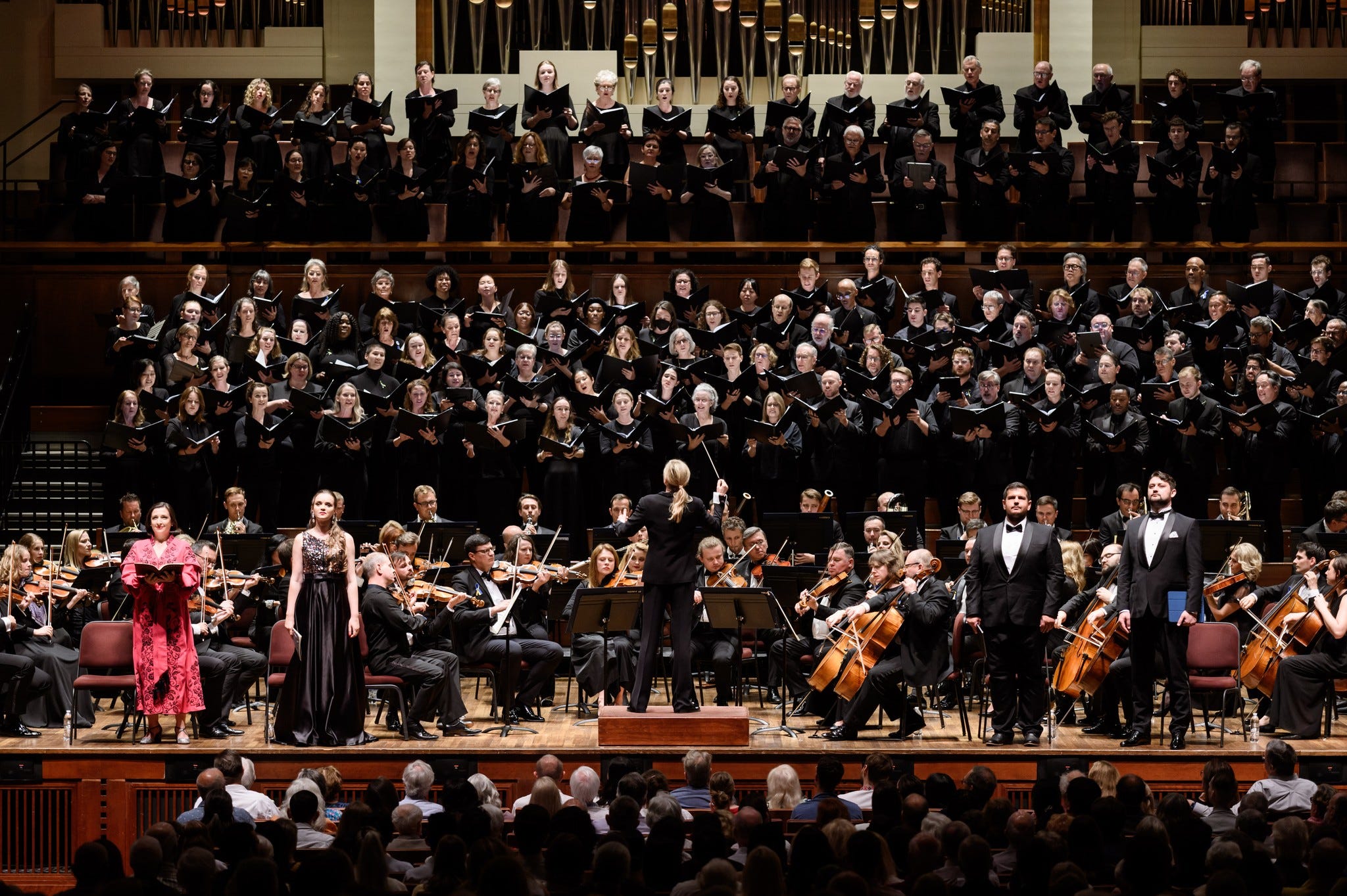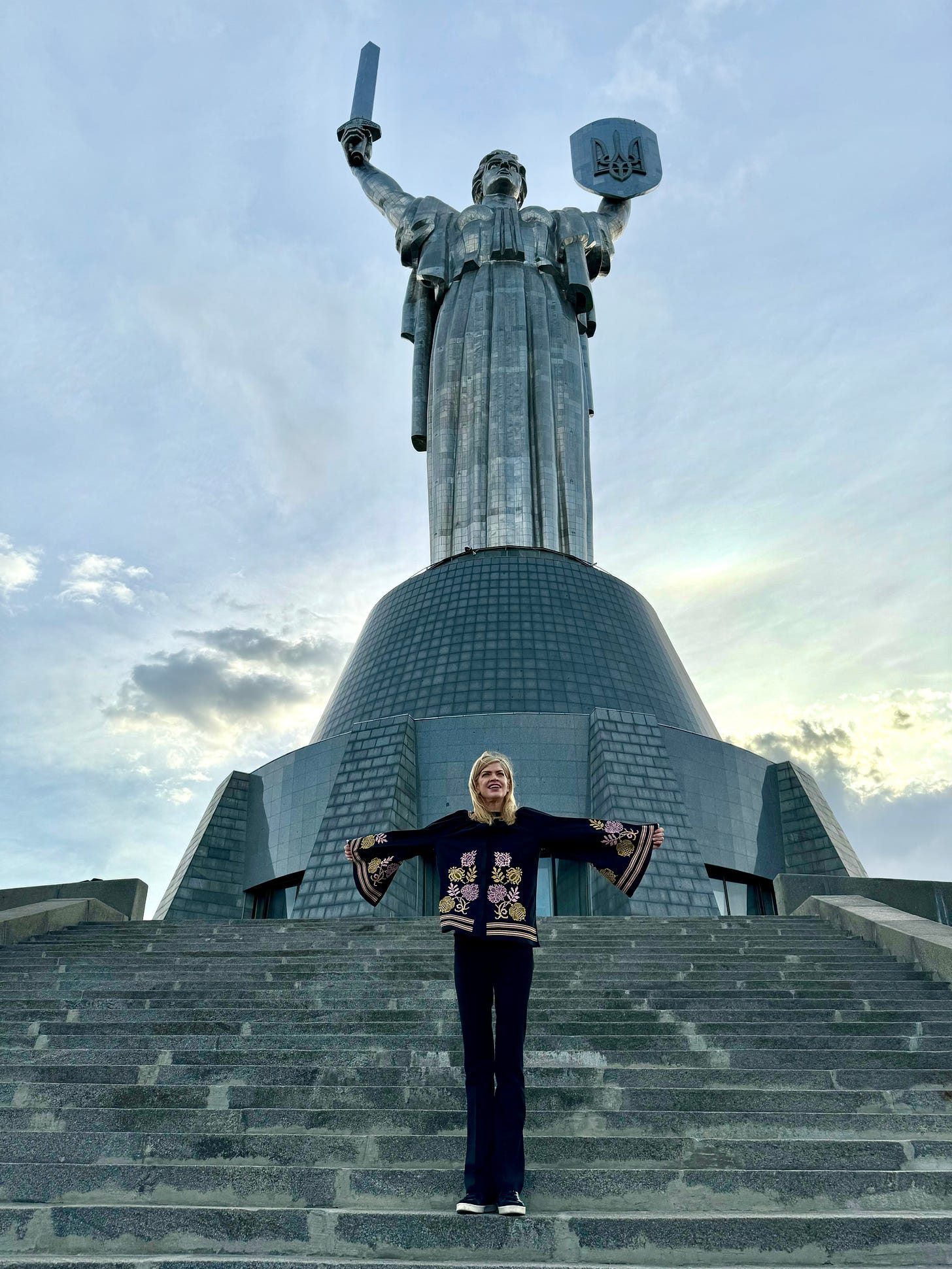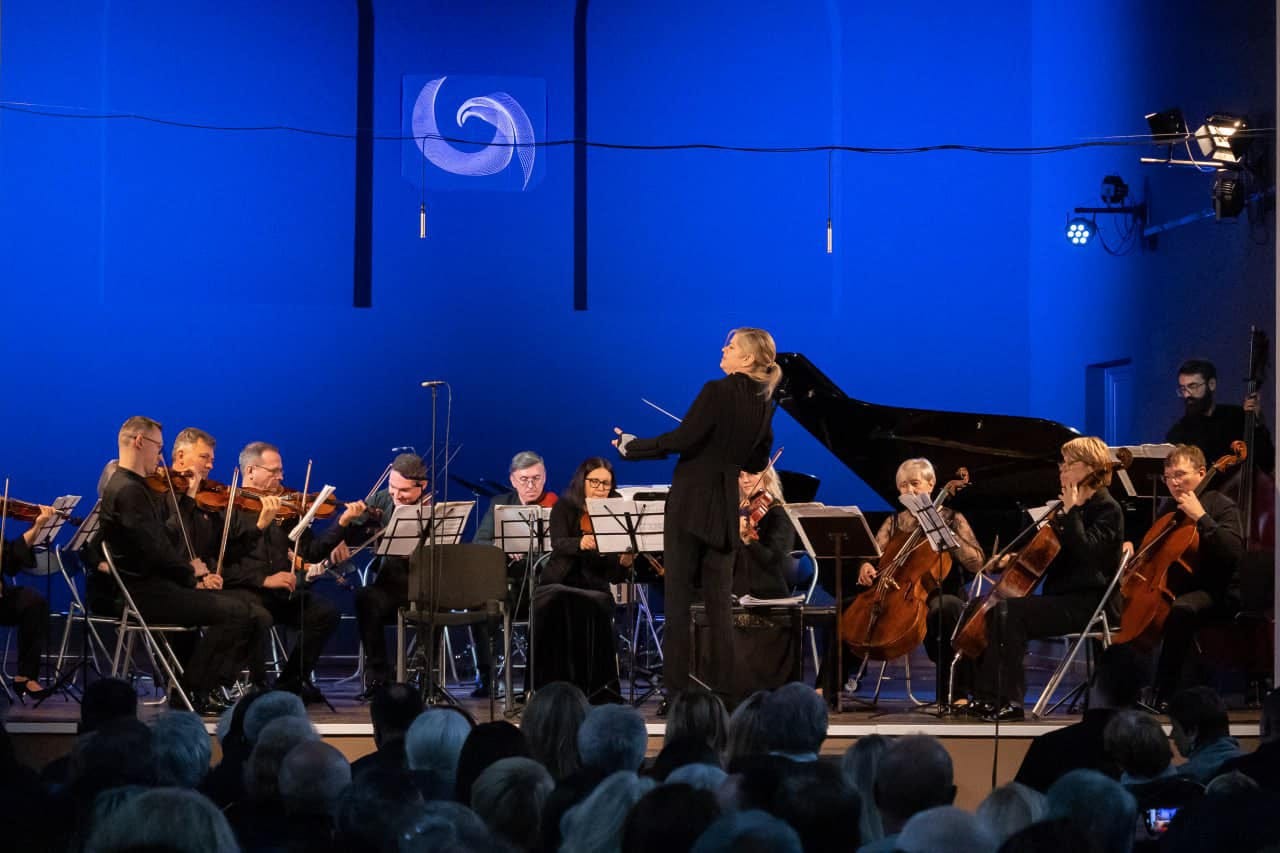She Started an Orchestra to Show Ukrainian Resolve to the World
But now, as the suffering goes on, she wonders: Why won’t Western allies do what it takes to help Ukraine win?

KERI-LYNN WILSON CARRIES A BATON, not a rifle, but that doesn’t make her any less a warrior. She is the founder and conductor of the Ukrainian Freedom Orchestra, and considers it an army in its own way.
“We are doing the music fighting on the cultural front. There is nothing passive about this orchestra. We are here as a symbol of the strength and greatness” of Ukrainian culture, Wilson told me in an interview this month. Her message to Russian President Vladimir Putin and his invading army could not be more clear, or more impassioned: “You cannot silence Ukraine’s culture. You cannot kill its soul, which is its music, its literature, and its art.”
Wilson was born in Milwaukee and raised in Winnipeg, where she learned Ukrainian dance and spent holidays with her Ukrainian-speaking great-grandmother. Her great-grandparents met in Winnipeg, she says, but they were both from Chernivtsi.
Andrij, one of Wilson’s Ukrainian cousins, was a journalism professor and artist in 2014, when Russia occupied and annexed the Crimean peninsula in southern Ukraine and backed pro-Russian separatists in Donbas in eastern Ukraine. He immediately joined the army and has been fighting ever since, Wilson says. He’s now a lieutenant colonel.
The United States and the European Union tightened sanctions on Russia after those 2014 incursions. Now we know that they were just a prelude to the savage full-scale invasion in February 2022. And now we know what Putin really wants: to reclaim and dominate an entire sovereign nation, and likely some of its European neighbors as well.
We also know that if Donald Trump and JD Vance win the election on November 5, they will be indifferent to the calamitous wrong done to Ukraine and the need to make it an example of what Putin—or any power-hungry leader, for that matter—cannot and must not be allowed to get away with. Vance has said explicitly that he doesn’t care what happens to Ukraine. And Trump is so bedazzled by Putin that he blames the war—Russia’s unprovoked military invasion—on Ukrainian President Volodymyr Zelensky.
Wilson worked with the Bolshoi Ballet and other Russian cultural institutions before the 2022 invasion, and says she has “a huge sense of guilt” about not understanding the meaning of Russia’s 2014 moves. I get it. I feel the same way. How could we have been so naïve?
The invasion put an end to that. By April 2022, in the new orchestra’s “artistic home” of Warsaw, Wilson had assembled 75 Ukrainian musicians—some of them refugees, some still based in Ukrainian cities, and some members of European orchestras. By July, after a whirlwind ten-day rehearsal period, she recalls, they suddenly found themselves “on the most prestigious stages of the world” in New York, Washington, D.C., and Europe.
That first of their three summer tours was a success in two main ways, Wilson says: It galvanized audiences, and “surprisingly, it was an artistic triumph.”
Two years later, this music literature major can attest to both. I was at the final concert of the ensemble’s 2024 Beethoven Ninth Freedom Tour, an August 4 sellout at the Kennedy Center in Washington. The program included Beethoven’s “Ode to Joy” and the Ukrainian national anthem, both sung in Ukrainian by the soloists and chorus.
We were an audience emotionally invested in Ukraine. We would have been inspired and teary, and given the musicians a thunderous ovation, regardless of their performance. Which was, for the record, intense, poignant, and beautiful.
Russia’s insatiable appetite for conquest
UKRAINE BROKE AWAY from the Union of Soviet Socialist Republics in 1991, with the Russian government in disarray after a coup attempt, and the USSR was dissolved by the end of that year. Now Putin is trying to claw back territory, control, and the mythical glory of the past.
As I’ve written, this is personal to me. Three of my four grandparents were from Russian families that fled the Russian Empire in the 1800s. I know one grandfather was born in Belostok, now Bialystok in Poland, and came to New York at around age 10. I found one great-grandfather listed on myheritage.com—among 527,394 people categorized as “Russians Immigrating to the United States” between 1834 and 1897 who gave their country of origin or nationality as “Armenia, Finland, Galicia, Lithuania, Poland, Russia, Russian Poles, or Ukraine.”
Such was the nineteenth-century reach of the Russian Empire, followed in the twentieth century by the even more powerful and aggressive USSR. Music, art, language, land, people—Russia historically has appropriated whatever it can, sowing war and grievance throughout.
Composer Sergei Prokofiev is a case in point, Wilson tells me—born in Ukraine, but claimed by Russia. Pyotr Ilyich Tchaikovsky and Igor Stravinsky are “Russian” composers, but Tchaikovsky’s mother and grandfather were Ukrainian. Stravinsky’s mother was from Kyiv and he spent summers in Ukraine. Who knew any of that? Or that “Carol of the Bells,” ubiquitous every December, was adapted by a Ukrainian composer from Ukrainian folk music?
Wilson sees herself as a guardian, restorer, and celebrator of Ukrainian musical culture. One of the most powerful moments at the Kennedy Center was Ukrainian composer Victoria Vita Polevá’s Bucha. Lacrimosa. It is so evocative that even if you know nothing about what happened in March 2022 in the Kyiv suburb of Bucha, the quiet music of life, abruptly punctured by the prolonged pounding of a drum and followed equally suddenly by silence, is recognizable as the story of a massacre.
Wilson’s husband, Peter Gelb, is the general manager of the Metropolitan Opera. A year ago, he commissioned an opera with music by Ukrainian composer Maxim Kolomiiets, based on “the true events of Ukrainian mothers who embarked on an arduous 3,000-mile journey behind enemy lines into Russia to rescue their children forcibly detained there by Russian authorities.” The International Criminal Court has charged Putin and Maria Alekseyevna Lvova-Belova, Russia’s Commissioner for Children’s Rights, with war crimes for the abduction of Ukrainian children, and issued warrants for their arrest.
The fraught politics of survival
CLASSICAL MUSIC RARELY MIXES OVERTLY with politics, I have found during decades of reporting and concertgoing. But Putin’s war—with its bald attempt to re-establish the principle that might makes right—makes Ukraine an exception. So there was former Polish President Lech Walesa at the freedom orchestra concert this year in Gdynia, Poland, where his Solidarity union movement was born, and according to Wilson, he said he regretted failing to gain NATO access for Ukraine during his presidency in the 1990s.
The London concert at St. Paul’s Cathedral—a setting that recalls a time when that city, like Ukraine’s cities, experienced terror and destruction from the skies—featured an appearance by Valerii Zaluzhnyi, Ukraine’s former army chief who is now its ambassador to the United Kingdom. At the Kennedy Center, State Department official Scott Weinhold said America was funding the printing of three million textbooks so Ukrainian students could learn about their own history and culture in their own language. Wilson concluded that evening with a fiery pledge to spend the rest of her life working to save and rebuild Ukraine.
She is the first to acknowledge concerts and acclaim from VIPs are no substitute for what Ukraine really wants and needs. “The concerts are extremely satisfying,” Wilson says, but they’re just a moment in time. Most of the musicians have family in Ukraine who are dying in air strikes and on the battlefield, “so the suffering hasn’t diminished in any way. And they of course feel abandoned by our government.”
Which government is that? I asked. “The Western democratic world,” Wilson said.
Zelensky is currently promoting a “victory plan” meant to turn this war from David vs. Goliath into Goliath vs. Goliath. It starts with an immediate, formal invitation to join NATO. “An invitation now with membership later will have no political cost—it’s a strong decision that requires only determination,” Zelensky argues. “An invitation strengthens our diplomatic stance and will be one of the main arguments to stop the war.”

Zelensky also wants authority to strike targets inside Russia using weapons from Europe and the United States. “Putin doesn’t need any permissions or approvals for long-range strikes,” he said pointedly at a conference last month. So far, President Biden has not signed off on that.
The delays, of money and weapons and authorities, make Wilson apoplectic. She follows all the news, all the politics. She knew in the moment that Trump had (insanely) blamed the war on Zelensky, that Russia is now getting troops from North Korea.
“What does it take? How many more men have to die for us to say, ‘Yes, defend yourselves—you need our weapons and you can defend yourselves’?” she asked. Ukrainians, she added, are not saying, “‘Shoot down the Kremlin.’ They’re saying, ‘Shoot down the weapons that are killing our people.’ That is fair.”
If Ukraine is given a free hand, one scenario is an increasingly ferocious Russian response, with threats of nuclear weapons and World War III. The menacing doomsday posturing in fact has already begun. At the same time, however, I find it very hard to argue that Ukraine should perpetually be forced to fight a limited war that cripples its ability to achieve significant victories and a stronger hand in future negotiations.
‘You never feel safe in Ukraine’
Wilson is literally staking her life on Zelensky’s strategy. Last month she was named music director of the Kyiv Camerata chamber orchestra, founded in 1977 to perform and commission Ukrainian music. “This was the obvious choice for me to make,” she says.
It’s her own version of boots on the ground—an annual commitment of five to six weeks, and unlike the Warsaw-based freedom orchestra, this smaller group is in Kyiv and requires travel to Ukraine. She was just there for a couple of weeks, conducting her first concert in her new post, and she will return in November when the camerata and the National Philharmonic Orchestra will hold a joint concert to honor the victims of Joseph Stalin’s terrifying political purges.
Does Kyiv feel safe? I asked. “You never feel safe in Ukraine, but you don’t think about it,” Wilson said. The last week she was there, she said, there were constant air raids and nights interrupted by hotel warnings to get to the shelter. “Ukrainians are so used to it,” Wilson says of the ever-present danger. “They’re just ready to die, if they’re going to die. That’s the mentality of my cousins.”
Wilson has phone apps that track air strike and drone activity in Ukraine, and where to go to be safe. When she’s not there, she uses them to check on friends and relatives in whatever area has been hit. When she is there, she’s less fatalistic than her cousins—still trying to pinpoint where the bomb shelters and other safe places are located, for instance, if she is out and about.
“On the other hand,” she adds, “I’m kind of, and don’t tell my husband—if I’m going to die, I’d rather die in Ukraine than from any other reason. To be in solidarity.”






